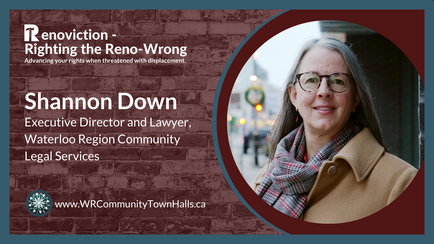Summary Report
Introduction & Speaker Bios
Regional Councillor Rob Deutschmann hosted a fourth panel discussion on September 21 2023, this time focussing on renovictions. He assembled a group of six panellists representing first-hand experience of eviction due to renovation - some having been victims of this practice, and others with legal or academic expertise.
"Renoviction" is a portmanteau of "renovation" and "eviction." It refers to the practice where landlords evict tenants under the pretense of needing to perform significant renovations on a property, only to then increase the rent and lease the property to new tenants at a higher rate.
A term that comes up repeatedly from the speakers is “Vacancy Decontrol”. This is a housing policy that allows landlords to reset the rent when the unit becomes vacant. In jurisdictions where rent control laws are in place, rents are typically capped to protect tenants from steep hikes.
In this report, the reader will find summaries of each of the six speakers, as well as compilations of the informal discussion and chat sections. The speakers are:
Maribel Jagorin is a long-term resident of Traynor Avenue in Kitchener and co-chair of the ACORN Tenant Union. She's an active advocate for affordable housing, sharing her experiences to educate the community and inspire collective action against housing displacement.
Michelle Knight serves as an Eviction Prevention Peer Worker at Waterloo Region's Social Development Centre (SDC). Michelle is deeply committed to tenant rights and systemic change, and her personal background directly informs her advocacy work. Striving to make a daily positive impact, she finds fulfilment in her role at SDC.
Meg Ruttan works at the intersection of climate and housing. Her family has been resisting eviction since 2017 and she has recently used her experiences to co-found the Waterloo Region chapter of ACORN.
Shannon Down is the Executive Director and a lawyer at Waterloo Region Community Legal Services. She has represented clients before various administrative tribunals as well as before the Superior Court of Justice.
Dr Laura Pin’s work examines how social inequality intersects with policy-governance regimes and how political scientists can use community-engaged research to understand participation in public policy. She works in the areas of public budgeting, housing policy, and civic engagement.
Dr Brian Doucet’s research examines housing, transportation and neighbourhood change. He uses a variety of research methods that render visible patterns, processes and experiences that do not normally show up in statistics.
"Renoviction" is a portmanteau of "renovation" and "eviction." It refers to the practice where landlords evict tenants under the pretense of needing to perform significant renovations on a property, only to then increase the rent and lease the property to new tenants at a higher rate.
A term that comes up repeatedly from the speakers is “Vacancy Decontrol”. This is a housing policy that allows landlords to reset the rent when the unit becomes vacant. In jurisdictions where rent control laws are in place, rents are typically capped to protect tenants from steep hikes.
In this report, the reader will find summaries of each of the six speakers, as well as compilations of the informal discussion and chat sections. The speakers are:
Maribel Jagorin is a long-term resident of Traynor Avenue in Kitchener and co-chair of the ACORN Tenant Union. She's an active advocate for affordable housing, sharing her experiences to educate the community and inspire collective action against housing displacement.
Michelle Knight serves as an Eviction Prevention Peer Worker at Waterloo Region's Social Development Centre (SDC). Michelle is deeply committed to tenant rights and systemic change, and her personal background directly informs her advocacy work. Striving to make a daily positive impact, she finds fulfilment in her role at SDC.
Meg Ruttan works at the intersection of climate and housing. Her family has been resisting eviction since 2017 and she has recently used her experiences to co-found the Waterloo Region chapter of ACORN.
Shannon Down is the Executive Director and a lawyer at Waterloo Region Community Legal Services. She has represented clients before various administrative tribunals as well as before the Superior Court of Justice.
Dr Laura Pin’s work examines how social inequality intersects with policy-governance regimes and how political scientists can use community-engaged research to understand participation in public policy. She works in the areas of public budgeting, housing policy, and civic engagement.
Dr Brian Doucet’s research examines housing, transportation and neighbourhood change. He uses a variety of research methods that render visible patterns, processes and experiences that do not normally show up in statistics.
Maribel Jagorin: The Human Toll of Renovictions

Maribel Jagorin, a tenant for nearly 13 years and the newly elected co-chair of the Acorn Tenants Union, outlined her concerns over "renovictions" led by the building's new owner. She emphasized that the notices disproportionately affect long-term tenants who are often from vulnerable groups such as seniors, immigrants, and low-income individuals, and are paying what is considered affordable rent.
She went on to describe various examples of neglect and lack of upkeep from the new property management company. Issues ranged from failure to replace broken washers to unfulfilled promises of reimbursement for self-purchased heaters. Additionally, Maribel mentioned that tenants are often threatened with additional eviction notices for minor or made-up infractions.
Maribel highlighted that tenants are fighting back through collective action. They have consulted with a paralegal and have been granted a group hearing by the landlord-tenant board. Community support is also strong; the Social Development Center has provided significant guidance, and the Acorn Tenant Union is providing the courage and education to resist eviction.
She went on to describe various examples of neglect and lack of upkeep from the new property management company. Issues ranged from failure to replace broken washers to unfulfilled promises of reimbursement for self-purchased heaters. Additionally, Maribel mentioned that tenants are often threatened with additional eviction notices for minor or made-up infractions.
Maribel highlighted that tenants are fighting back through collective action. They have consulted with a paralegal and have been granted a group hearing by the landlord-tenant board. Community support is also strong; the Social Development Center has provided significant guidance, and the Acorn Tenant Union is providing the courage and education to resist eviction.
Michelle Knight: Empowering Tenants Through Community & Advocacy

Michelle Knight is a peer support worker at the Social Development Centre (SDC) Waterloo Region, focusing on eviction prevention. She emphasizes that she herself is a tenant and understands the issues tenants face, especially those from marginalized communities like her own indigenous and LGBTQ+ communities. SDC aims to help tenants understand their rights and responsibilities, offering free services like helping in landlord-tenant board hearings.
The SDC takes a holistic approach in their support, recognizing that eviction is not a standalone issue but affects various aspects of a tenant’s life. They have introduced a new role of a Tenant Support Organizer, aimed at creating partnerships among tenants facing multi-unit evictions to facilitate collective action. Michelle notes that SDC is also closely tied to community legal services and sometimes pools resources to hire a paralegal, especially for tenants who don’t qualify for free legal services.
Lastly, Michelle clarifies that while SDC does not have specific mental health resources, they do provide peer support which includes listening to tenants' experiences. Currently operating with only two part-time peer workers across three cities, SDC is exploring the possibility of bringing on volunteers to enhance their reach and services, but they question their current capacity to manage additional help.
The SDC takes a holistic approach in their support, recognizing that eviction is not a standalone issue but affects various aspects of a tenant’s life. They have introduced a new role of a Tenant Support Organizer, aimed at creating partnerships among tenants facing multi-unit evictions to facilitate collective action. Michelle notes that SDC is also closely tied to community legal services and sometimes pools resources to hire a paralegal, especially for tenants who don’t qualify for free legal services.
Lastly, Michelle clarifies that while SDC does not have specific mental health resources, they do provide peer support which includes listening to tenants' experiences. Currently operating with only two part-time peer workers across three cities, SDC is exploring the possibility of bringing on volunteers to enhance their reach and services, but they question their current capacity to manage additional help.
Meg Ruttan: From Survival to Solidarity

Meg Rattan is a co-founder of Waterloo Region Acorn and a housing advocate. She emphasizes that their fight is for survival rather than passion, as housing insecurity affects a significant number of tenants in the Waterloo region. Their mission is to give a voice to low and moderate-income tenants who are disproportionately impacted by the housing crisis.
The organization, Acorn, aims to bring about systemic changes by working on tenant issues, particularly focusing on "renovictions." They are pushing for a rent eviction bylaw that would protect tenants from being evicted due to renovations. Meg describes how landlords exploit loopholes to evict tenants, thereby contributing to the housing crisis.
In addition to policy changes, Acorn is also a platform for community support, especially for those facing the emotional trauma associated with eviction. Although not a formal mental health support system, the organization allows people to share their stories, thus creating a network of support. They are planning rallies and direct actions to gain public attention and put pressure on policymakers.
The organization, Acorn, aims to bring about systemic changes by working on tenant issues, particularly focusing on "renovictions." They are pushing for a rent eviction bylaw that would protect tenants from being evicted due to renovations. Meg describes how landlords exploit loopholes to evict tenants, thereby contributing to the housing crisis.
In addition to policy changes, Acorn is also a platform for community support, especially for those facing the emotional trauma associated with eviction. Although not a formal mental health support system, the organization allows people to share their stories, thus creating a network of support. They are planning rallies and direct actions to gain public attention and put pressure on policymakers.
Shannon Down: Loopholes & Inadequate Protections

Shannon Down asserts that the growing trend of renovictions in Ontario is largely due to a loophole in the province’s rent control laws. Specifically, these laws only apply during a tenant’s existing lease; once the lease is terminated, landlords are free to set new, higher rates. This creates a strong financial incentive for landlords to evict current tenants under the guise of renovations, just so they can raise the rent for new tenants. Legal clinics have observed a surge in renoviction cases, though precise statistics are lacking.
In addition to exploiting legal loopholes, landlords often employ intimidation and coercion tactics. Down suggests that landlords take advantage of maintenance neglect to justify sudden, extensive renovations that require vacant possession, thus leading to renovictions. The law does provide some protections—such as the need for a building permit and compensations—but these are usually insufficient and slow to enforce, leaving tenants vulnerable.
Down also discusses how these issues disproportionately affect older housing units, which are generally more affordable. Vulnerable populations, including low-income families, people with disabilities, and seniors, are most at risk. Though tenants technically have the right to return to their units post-renovation, this right relies on the landlord’s good faith, which is often lacking. Down concludes by highlighting the important role of tenant organizations and community advocates in filling the gap left by inadequate laws.
In addition to exploiting legal loopholes, landlords often employ intimidation and coercion tactics. Down suggests that landlords take advantage of maintenance neglect to justify sudden, extensive renovations that require vacant possession, thus leading to renovictions. The law does provide some protections—such as the need for a building permit and compensations—but these are usually insufficient and slow to enforce, leaving tenants vulnerable.
Down also discusses how these issues disproportionately affect older housing units, which are generally more affordable. Vulnerable populations, including low-income families, people with disabilities, and seniors, are most at risk. Though tenants technically have the right to return to their units post-renovation, this right relies on the landlord’s good faith, which is often lacking. Down concludes by highlighting the important role of tenant organizations and community advocates in filling the gap left by inadequate laws.
Dr. Laura Pin: Rights vs. Rights

Dr. Laura Pin expressed her deep frustration at the tension between property rights and the human right to housing, specifically in the context of renovictions. She attributes much of this issue to the policy of "vacancy decontrol," implemented in the 90s, which incentivizes landlords to evict tenants to reset the rent at market rates. The system disproportionately places the onus on tenants to enforce their rights, often under duress from landlords who use extra-legal measures to force them out.
Pin praised the idea of landlord registries and rent banks, tools that can aid tenants facing the risk of eviction. These rent banks could function as hubs for legal and financial assistance, much like in British Columbia and Manitoba. However, Pin ultimately sees real rent control as the definitive solution to the renoviction crisis, and the current provincial government's lack of interest in establishing rent banks or expanding social programs makes social and political pressure crucial.
A significant piece of advice Pin gave was that tenants should never vacate their units based solely on receiving forms like N13 from landlords; only a sheriff can enforce an eviction. She also acknowledged the existing gaps in tenant protection and rent regulation, underscoring that while municipalities are making strides, this is fundamentally a provincial issue requiring state-level interventions.
Pin praised the idea of landlord registries and rent banks, tools that can aid tenants facing the risk of eviction. These rent banks could function as hubs for legal and financial assistance, much like in British Columbia and Manitoba. However, Pin ultimately sees real rent control as the definitive solution to the renoviction crisis, and the current provincial government's lack of interest in establishing rent banks or expanding social programs makes social and political pressure crucial.
A significant piece of advice Pin gave was that tenants should never vacate their units based solely on receiving forms like N13 from landlords; only a sheriff can enforce an eviction. She also acknowledged the existing gaps in tenant protection and rent regulation, underscoring that while municipalities are making strides, this is fundamentally a provincial issue requiring state-level interventions.
Dr. Brian Doucet: Re-Balancing the Scale

Dr. Brian Doucet talked about the power municipalities have to enforce strict building permit requirements to deter bad-faith renovictions. He cited New Westminster and Burnaby in British Columbia as exemplars, where city councils, under significant public pressure, enacted strong anti-renoviction bylaws. These bylaws require landlords to have a concrete plan for renovations and tenant relocations. They also mandate the provision of temporary accommodations and moving cost coverages, thereby placing the onus on landlords, not tenants.
Doucet was critical of Ontario's existing policies, which he feels place the burden of responsibility disproportionately on tenants. He highlighted how such rules in Ontario contrast with those in New Westminster and Burnaby, where tenant protection has been the primary focus. He indicated that despite these stringent laws, cities in British Columbia continue to flourish with ongoing developments, debunking the myth that such regulations would stifle growth or deter landlords.
In conclusion, Doucet stressed that the lack of proper statistics shouldn't deter people from acknowledging that renovictions are a real issue. The importance of collective stories and experiences should serve as compelling evidence. He believes that cities have the means to implement stricter rules, and they should do so to ensure a fair housing landscape.
Doucet was critical of Ontario's existing policies, which he feels place the burden of responsibility disproportionately on tenants. He highlighted how such rules in Ontario contrast with those in New Westminster and Burnaby, where tenant protection has been the primary focus. He indicated that despite these stringent laws, cities in British Columbia continue to flourish with ongoing developments, debunking the myth that such regulations would stifle growth or deter landlords.
In conclusion, Doucet stressed that the lack of proper statistics shouldn't deter people from acknowledging that renovictions are a real issue. The importance of collective stories and experiences should serve as compelling evidence. He believes that cities have the means to implement stricter rules, and they should do so to ensure a fair housing landscape.
The Comment Section
Much like past town hall events, the chat was filled with vibrant discussions and exchanges between the panellists and the audience. A lot of attendees expressed appreciation for the insights shared by the panellists and supported each other’s calls for action. Below are some notable comments…
|
|
We need SO many volunteers, email us at [email protected]… We also do direct outreach in the community, and we pressure council and government and landlords to do right… ACORN has paired up with vivre en ville from Quebec to create a rental registry in Ontario! You can anonymously add your current and past rents, and we hope Landlord Licensing would work like Toronto's Restaurant Licensing wherein you can publicly see your landlords history (rentalregistry.ca)
Acer Bonaparte, ACORN Organizer
Shining a light mattered a lot. But also not simply leaving and not being intimidated. [The landlord] is only really able to get rid of us now (maybe) because he got a rezone from the City of Kitchener… Whatever we can do to take the pressure off of tenants is hugely helpful. The stress and work that resisting eviction cause is immense for people. That's another reason we've started a union here.
-Meg Ruttan
I'm in a 4plex and my landlord has turned 2 of them into Air BnBs, trying to get me and the senior who lives upstairs out.
-Jen S.
I have been an immigrant here for 18 years, citizen since 2009. I find any interactions with government services to range from highly toxic to traumatizing, which mental healthcare here only bothers to address for 8 hours, regardless of the situation or severity.
-मानस Mānas
So we need community owned short term rentals for people to move to if they get a notice so they can move back - coupled with legal support to enforce those rights!
-Sean Campbell
Here's a list of resources with information on different evictions and how you can fight them (including lists of requirements for evictions to be valid):
https://acorncanada.org/resources/tenant-rights-in-ontario/ -Vonica, ACORN organizer
What I like about the Toronto bylaw is it takes some pressure off tenants in that it requires municipal monitoring of tenant unit renovations…
Ontario Ombudsman report on how the LTB is failing: -Dr. Laura Pin
I can relate perfectly with Laura in terms of the law being at crossroads with the reality on ground. I came to Canada with my family a month ago, and I couldn't get any accommodation because landlords were asking for 6 months rent even when they know that this is completely against the law… On the economic side, rent control should encourage more housing, affordable housing, and not the other way round. Weak enforcement, again, should be blamed.
-Gerald
We’ve just finished a big report on ‘Thinking Beyond the Market.’ In it, we look at a variety of solutions that are already making a difference across Canada, including anti-renoviction bylaws and rent control.
-Dr. Brian Doucet
|
|
Recordings of this, and previous, town halls are available on the website, and there will be more to come.


